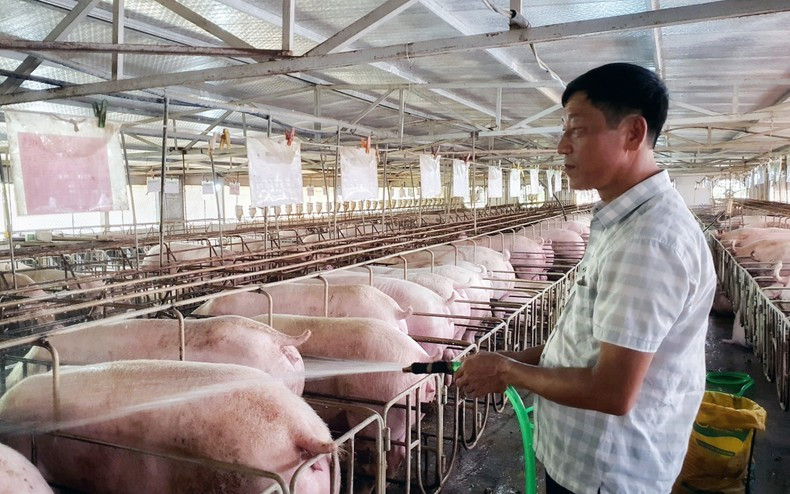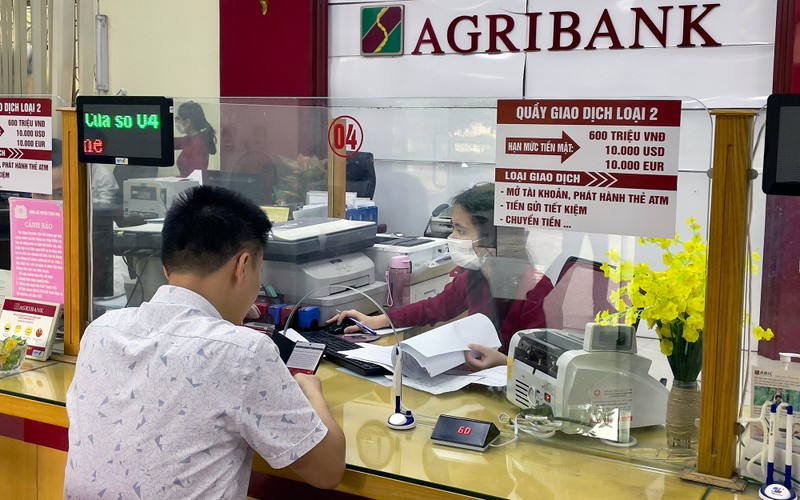Notably, the interest rate reduction is one of the important policies the banking sector has been implementing drastically with the spirit of companionship, sharing and responsibility towards people and businesses, contributing to facilitating economic recovery and growth.
Facilitating access to new loans
According to the latest statistics from the SBV, the average new deposit currently has an interest rate of 6.0 - 6.1 %/year and loans from 9 - 9.2 %/year. These figures showed that the rate of interest rate reduction is recently quite positive, Standing Deputy Governor of the SBV Dao Minh Tu noted.
More than a month ago, on March 28, in a letter sent to the SBV, the Chairman of the Dong Nai Livestock Association Nguyen Tri Cong, urgently proposed the SBV have a policy to extend the principal debt, reduce a part of interest rates such as support policies during the COVID-19 period for the livestock industry and continue to extend credit packages for key livestock areas to maintain operations.
Not only the livestock industry, but enterprises in the country are also facing many other difficulties such as high prices of raw materials and input fuels, and the supply chain is still at risk of disruption and lack of new orders rare. At the same time, access to capital is still difficult, and interest rates are adjusted, causing business costs to increase by 5-10%.
On April 23, the Governor of the State Bank of Vietnam issued Circular No.02/2023/TT-NHNN, stipulating that credit institutions and foreign bank branches restructure the repayment term and keep the debt group unchanged to support customers in difficulty, similar to that implemented during the COVID-19 epidemic.
The remarkable point of Circular No.02 compared with previous debt restructuring circulars, is that the circular allows credit institutions and foreign bank branches to take the initiative in reviewing and assessing the difficulties of customers, to decide the restructuring of customer loans.
Many economic experts also said that by creating favourable conditions for extending the loan period and repaying bank loans, Circular No.02 will help reduce debt repayment pressure for customers, contributing directly to solving difficulties for people, and businesses, creating conditions for people and businesses to continue to cycle capital and access new loans to serve production, business, and consumption, thereby contributing to production development and economic growth.
Pham Quang Thang, Deputy General Director of Techcombank shared, that Circular No.02 was issued promptly, meeting the market's desire to stabilise the cash flows of businesses and restore production and business for development. Banks have had a lot of experience in debt restructuring during the COVID-19 period, and with that experience, the implementation will be highly effective.
Further reducing interest rates, stimulating credit demand
It can be said that to remove difficulties in capital sources for people and businesses, in the past four months, the State Bank has implemented many policies synchronously. In addition to the policy of extending and delaying debt, extending the repayment term for businesses that have difficulties to repay their debts, including interest and principal for one year as mentioned above; the SBV also has other policies such as operating monetary policy to ensure stable currency value and exchange rate; creating room and enough credit for economic recovery and growth.
 |
| Bui Quang Hieu and his family from Tien Kien Commune, Lam Thao District, Phu Tho Province, develop their business from Agribank’s loan. |
The SBV has always ensured liquidity for the economy and credit institutions; facilitated the real estate and bond markets; implemented a package of 120 trillion VND for real estate with three priority subjects; directed all commercial banks to reduce administrative and procedural costs to support businesses.
In the past time, the interest rate reduction is one of the very important and meaningful policies, helping businesses in their production and operation, said SBV Deputy Governor Dao Minh Tu.
The move to reduce interest rates from commercial banks has created a lot of expectations to help businesses and borrowers reduce capital costs. According to Kim Nam Group Chairman Nguyen Kim Hung, businesses received the news of interest rate reductions with a very positive sentiment because they believe their business plans will be promoted more smoothly thanks to low costs, on the other hand, they can also take advantage of more loans from banks.
However, although the SBV has implemented many solutions to remove difficulties in capital sources for people and businesses, credit growth in the whole system has remained low so far. As of April 27, according to preliminary statistics, the credit growth of the whole economy increased by 3.04% compared to the end of 2022. "Thus, credit growth was slow in the context that at the beginning of the year, it was not restricted by the growth limit. credit growth and in the condition that the liquidity of the system of credit institutions has improved, which shows that the capital absorption is low," said Governor Nguyen Thi Hong.
Therefore, to further improve credit access, Governor Nguyen Thi Hong said that it is necessary to synchronously deploy many other solutions from ministries, branches and localities. On the other hand, the promotion of credit to support economic growth should be in harmony, to ensure the safety of the credit institution system.
Recently, credit growth has been slow not only in Vietnam; when some US banks collapsed, spreading to Europe, banks in many countries were also more cautious when lending, to ensure liquidity, and were willing to pay depositors.
For Vietnam, it is not advisable to rely too much on credit growth to promote economic growth, especially long-term credit, but instead, to promote growth, public investment and other capital resources, should be promoted to ensure harmony between macroeconomic and monetary objectives, a representative from the SBV noted.
















